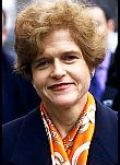Holocaust professor forms Sudan aid group
BY DAHLEEN GLANTON, Chicago Tribune
 ATLANTA, Dec 28, 2004 (KRT) — At the end of Deborah Lipstadt’s course on the Holocaust each semester, students at Emory University usually bombard her with the same question: “Why didn’t anyone do something about it?”
ATLANTA, Dec 28, 2004 (KRT) — At the end of Deborah Lipstadt’s course on the Holocaust each semester, students at Emory University usually bombard her with the same question: “Why didn’t anyone do something about it?”
She gives them her standard answers: Perhaps Americans didn’t know what was going on in the concentration camps. Or maybe Americans were overwhelmed by the Great Depression and feared that if they were allowed in, Jewish immigrants would compete for limited jobs.
Years from now, Lipstadt said, when history books refer to the genocide in the African country of Sudan, students will again want to know what Americans did to stop it. That made her decide that she would be among those who tried to help.
“I realized that I was sounding more like an apologist for America. And when the day comes that students ask about Sudan, I feared that I would again not have an adequate answer,” said Lipstadt, a professor of modern Jewish and Holocaust studies and director of the Tam Institute for Jewish Studies at Emory in Atlanta. “How can I teach about genocide and live though another genocide without doing anything?”
Last fall, Lipstadt called a colleague in the African-American studies department and another in the religion department. Word quickly spread across campus, as one person called another. Before long, more than 100 students and faculty members had come together to form an organization called the Sudan Crisis Working Group. Their mission was to raise money and spread the word about atrocities in Sudan.
Sudan – Africa’s largest country geographically – has been fighting a civil war for more than 20 years. But since early 2003, conflict has escalated, with fighting in the western province of Darfur between the janjaweed militias, supported by the government, and rebels.
As a result, more than 2 million civilians, mainly dark-skinned Africans, have been killed, raped or driven from their homes in Darfur by Sudanese troops and the mostly Arab janjaweed in what the U.S. government is calling a genocide. Both groups are Muslims, differentiated only by skin tone.
The Emory group brought together students of many groups, including Jews, Muslims, African-Americans and whites. In recent months, it has held more than a dozen fundraisers, poetry slams, public forums and a “fast-a-thon,” in which participants went without food for a day, raising more than $1,500 in pledges. The group also set up a Web site to solicit donations for groups such as Doctors without Borders/Medecins Sans Frontieres, which is treating malnutrition, disease and offering sexual abuse counseling in Sudan.
“It’s important that students have a voice, and we definitely raised a tremendous amount of awareness throughout the Emory community,” said Jacob Cherry, 20-year-old junior from Irvington, N.Y., majoring in international relations. “People cannot afford to be apathetic or uninformed when it comes to this kind of issue.”
Ansley Newsom, 32, who is working on a master’s degree in theological studies, said most people sat back and did nothing 10 years ago when genocide occurred in Rwanda. And if nothing is done this time, she said, it could happen again someplace else. “It is very frustrating to me because I feel like the Bush administration should step in and do something,” said Newsom, of Atlanta. “We are supposed to be the bastion of justice and the light of the world, but a lot of people are questioning that, including myself.”
